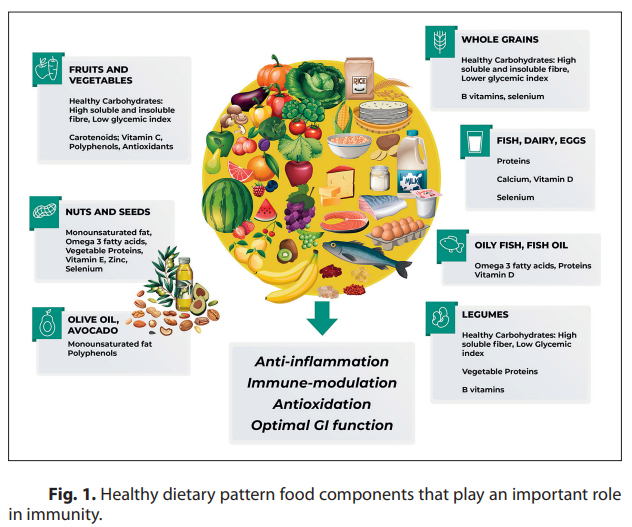Nutrition and Immunity: Key Nutrients and Trends in Nutrient Supplementation in Women and Children
Micronutrient deficiencies represent a public health problem worldwide. One-third of the population suffers from at least one micronutrient deficiency. Pregnant women and children are particularly affected groups, as well as individuals living in low- and middle-income countries (LMICs). Anemia, iron, vitamin A, iodine, and vitamin D deficiencies are prevalent in many countries. Even though micronutrient intakes have improved around the world, there are still inadequate intakes of some nutrients in many countries, including calcium, iron, zinc, vitamin A, and vitamin C.1
In this context, and considering the COVID-19 pandemic, it is very relevant to improve nutritional status around the world. It is well known that nutrition plays a key role in strengthening the immune system. A healthy dietary pattern provides adequate quantity and quality of protein, which is associated with a reduced risk of infection. Also, a healthy diet includes an adequate amount of total fat and healthy fats, specifically monounsaturated and polyunsaturated fat (PUFA). Omega 6 PUFA may have proinflammatory effects, while omega 3 PUFA (eicosapentaenoic acid-EPA and docosahexaenoic acid-DHA) exerts antiinflammatory effects, among other health benefits. Only some countries in the East Asia region meet the daily intake recommendation of DHA (250 mg per day). Monounsaturated fat may have antioxidant, antimicrobial, and antiviral effects. A healthy diet also provides high-quality carbohydrates (low glycemic index and/or high-fiber foods) (grains, legumes, fruits, vegetables, milk) and limits high glycemic index foods and added sugars, which have been associated with higher concentrations of C-reactive protein and proinflammatory cytokines. A healthy diet provides many nutrients with anti-inflammatory and antioxidant properties. Vitamins D, A, E, C, B-complex, selenium, zinc, and iron, among others, elicit immune boosting properties, and the deficiency of any of these micronutrients is detrimental to the immune function (Fig. 1).2, 3 In this context, nutrient supplementation may be relevant in some individuals and populations.

For pregnant women, the World Health Organization recommends iron and folic acid (preconceptionally) supplementation. In women with a high risk of preeclampsia and low calcium intakes, calcium supplementation is necessary to reduce the risk of preeclampsia. In women with nutrition deficiencies, malnutrition, food insecurity, or vulnerable groups, multiple micronutrient supplementation (MMS) is recommended. MMS appears to decrease the risk of low birth weight (LBW) and small for gestational age (SGA) newborns, and probably, the risk of preterm birth. Other nutrients, such as DHA, zinc, and vitamin B12, may be needed, particularly in the presence of deficiencies or with inadequate intake of these nutrients.4 In the case of vitamin D, controversy exists about doses and benefits of supplementation, but recent evidence has shown possible protection against gestational diabetes, as well as LBW and SGA newborns. In children, vitamin A supplementation is associated with a reduction in all-cause mortality, and mortality associated with diarrhea and zinc supplementation, mainly in Asia, has been shown to decrease the risk of acute respiratory infections.5 In terms of immunity in adults, vitamin D supplementation appears to reduce the probability of intensive care unit admission in hospitalized patients with COVID-19, and to decrease the Fig. 1. Healthy dietary pattern food components that play an important role in immunity. 16 risk of mortality. No clear effect has been observed for primary prevention of COVID-19.6 Some studies in adults, mainly in North America, have shown that vitamin D supplementation reduces the risk of respiratory tract infections, while other studies have not.5 This concern for improving immunity in some individuals has led to an increase in the use of supplements. In general, people using supplements tend to be older, female, have higher education, higher income, and healthier lifestyles, but there is scarce information from LMICs.7 In the COVID-19 pandemic, studies from different countries reported an increased use of dietary supplements, increasing the over-the-counter use of supplements, probably resulting in excessive intake of some nutrients. Countries should focus on increasing the nutrient density of the food supply, improving access and utilization of nutrient-dense foods, and decreasing the availability of ultra-processed, energy-dense foods to promote health and optimal immunity. Implementing nutrition interventions such as the promotion of healthy diets, the recommendation of individual nutrient supplementation schemes, and nutrition education should be a priority. Nutrition assessment is critical to adequately recommend micronutrient supplementation for individuals or populations. There is a need for high-quality evidence of micronutrient supplementation studies and its effect on preventing and treating infections and COVID-19.
References
1 Han X, Ding S, Lu J, Li Y. Global, regional, and national burdens of common micronutrient deficiencies from 1990 to 2019: a secondary trend analysis based on the Global Burden of Disease 2019 study. EClinicalMedicine. 2022 Feb 12;44:101299.
2 Calcuttawala F. Nutrition as a key to boost immunity against COVID-19. Clin Nutr ESPEN. 2022;49:17–23.
3 Iddir M, Brito A, Dingeo G, Fernandez Del Campo SS, Samouda H, La Frano MR, et al. Strengthening the immune system and reducing inflammation and oxidative stress through diet and nutrition: considerations during the COVID-19 crisis. Nutrients. 2020 May 27;12(6):1562.
4 World Health Organization. WHO recommendations on antenatal care for a positive pregnancy experience. Geneva: WHO Press; 2016.
5 Vlieg-Boerstra B, de Jong N, Meyer R, Agostoni C, De Cosmi V, Grimshaw K, et al. Nutrient supplementation for prevention of viral respiratory tract infections in healthy subjects: a systematic review and meta-analysis. Allergy. 2022 May;77(5):1373–88.
6 Hosseini B, El Abd A, Ducharme FM. Effects of vitamin D supplementation on COVID-19 related outcomes: a systematic review and meta-analysis. Nutrients. 2022 May 20;14(10):2134.
7 Zhang FF, Barr SI, McNulty H, Li D, Blumberg JB. Health effects of vitamin and mineral supplements. BMJ. 2020 Jun 29;369:m2511.
